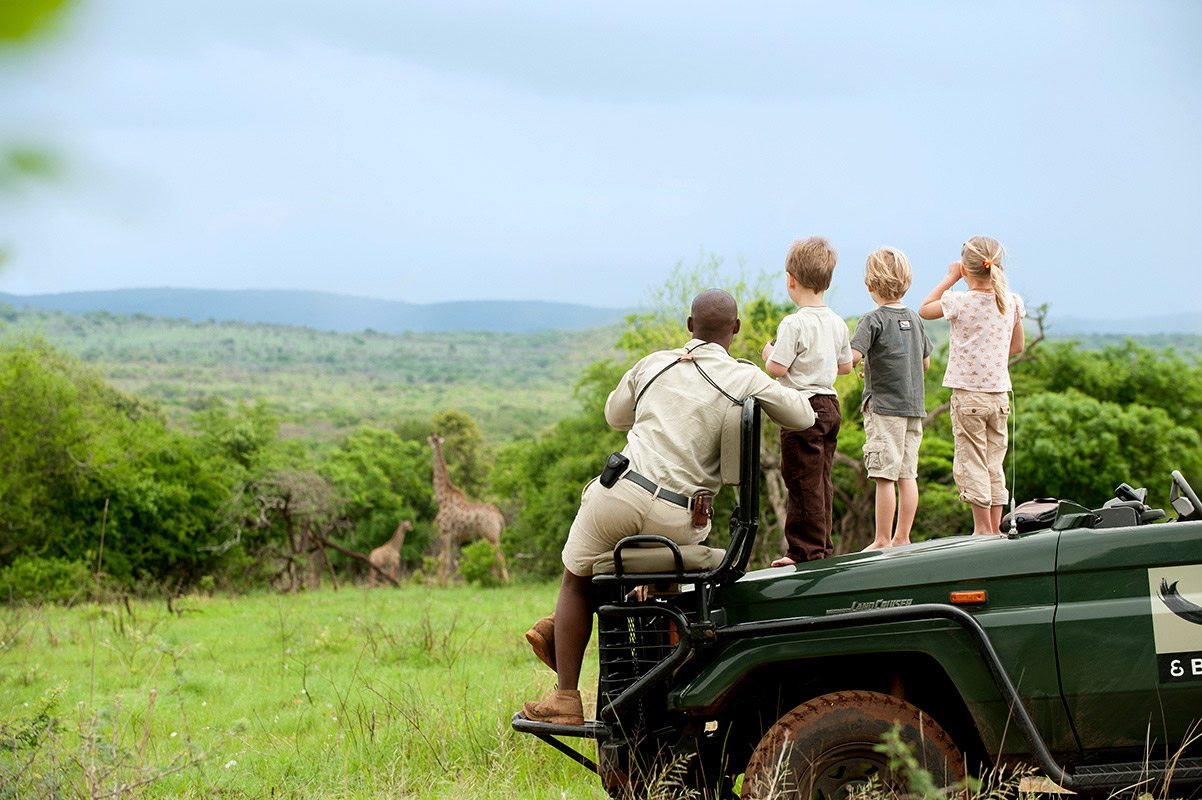Embarking on a family safari tour creates transformative experiences that resonate for years to come. Watching your children’s faces illuminate as they encounter big game wildlife for the first time delivers moments of pure magic—whether it’s their initial sighting or a return journey to Africa’s premier wildlife destinations. These safaris with teenagers possess the remarkable ability to eclipse screen time, drawing even the most device-attached teens into the natural world’s captivating drama. From the vast elephant herds of Botswana to the iconic Big Five encounters in Kruger National Park, African safari tours for families combine adventure, education, and bonding opportunities unlike any other vacation experience. This comprehensive guide explores everything parents need to know about planning family wildlife safaris, from selecting the best destinations to understanding age requirements and choosing between various safari tour packages across South Africa, Botswana, Kenya, Tanzania, and Zimbabwe.
Understanding Family Safari Tours: What to Expect
The Reality of Safari Life with Teens
For those planning their first safari with teenagers, understanding daily routines helps set appropriate expectations. Early morning game drives typically begin before sunrise—when African wildlife is most active and temperatures remain comfortable. While these bleary-eyed early starts might initially challenge teenagers accustomed to sleeping late, the thrill of spotting lions, elephants, or leopards in their natural habitat quickly overshadows any complaints about wake-up times.
Wi-Fi connectivity varies significantly across African safari destinations. Remote wildlife reserves and bush camps often have limited or no internet access—information worth sharing with teens before departure. However, this digital detox often becomes an unexpected benefit, as family safari experiences naturally encourage presence and engagement with surroundings.
The camaraderie developed on small group wildlife holidays provides social opportunities that replace digital connections. Meeting like-minded families creates bonds and friendships that enhance the safari adventure, transforming screen time into quality “seeing time” as teens share experiences with peers who appreciate the extraordinary nature of African wildlife encounters.
Where to Go: Best Family Safari Destinations in Africa
South Africa: The Perfect First Safari Destination
When researching where is the best place for family safari, South Africa consistently emerges as an ideal starting point. The country offers an exceptional combination of wildlife viewing opportunities, comfortable infrastructure, excellent cuisine, iconic beaches, and relatively affordable safari prices compared to other African destinations.
Kruger National Park and its surrounding private game reserves provide outstanding possibilities for Big Five sightings—lions, leopards, elephants, buffalo, and rhinoceros. The park’s well-developed road network, professional guides, and diverse ecosystems create optimal conditions for family safari tours.
South Africa safari advantages include:
- Malaria-free zones in some regions during winter months
- Excellent safari lodge options across various price points
- Easy combination with beach destinations along the Indian Ocean coast
- English-speaking guides and tourism infrastructure
- Year-round safari season with distinct seasonal wildlife patterns
Botswana: Ultimate Big Five Safari Experience
For families asking where to see Big Five in Africa, Botswana represents perhaps the finest option available. This Southern African country delivers year-round wildlife abundance within vast national parks and game reserves that allow for more intimate viewing experiences without the crowds common in other popular destinations.
Chobe National Park is particularly renowned for its elephant population—one of Africa’s largest concentrations. During dry season months, thousands of elephants congregate along the Chobe River, creating spectacular viewing opportunities. The Okavango Delta, a UNESCO World Heritage Site, offers unique water-based safari experiences combining mokoro (traditional canoe) excursions with conventional game drives.
Moremi Game Reserve, situated within the Okavango Delta, provides opportunities for wild camping experiences where families sleep under canvas surrounded by African wildlife sounds—an extraordinary experience that answers the question what to expect on African safari in the most immersive way possible.
Kenya and Tanzania: Classic East African Safari
Kenya safari tours and Tanzania wildlife experiences offer classic East African safari adventures featuring the Great Migration, Masai Mara, Serengeti National Park, and Ngorongoro Crater. These destinations provide spectacular wildlife concentrations and cultural encounters with Maasai communities.
The Great Migration—involving millions of wildebeest, zebras, and gazelles—represents one of nature’s most impressive spectacles. Timing family safaris to coincide with migration movements creates unforgettable experiences, though specific timing varies by year and location.
Zimbabwe: Victoria Falls and Wildlife Combination
Zimbabwe safari destinations combine wildlife viewing with one of the world’s natural wonders—Victoria Falls. Hwange National Park offers excellent Big Five encounters, while the falls provide dramatic scenery and adventure activities suitable for teenagers on safari.
Essential Safari Questions Answered
How to See the Big Five on Family Safari
The Big Five—lions, leopards, elephants, buffalo, and rhinoceros—were originally named by hunters as the five most difficult African animals to hunt on foot. Today, these species represent the most sought-after wildlife sightings on safari.
Best countries for Big Five safari include:
Botswana: Particularly Chobe National Park, Moremi Game Reserve, and Okavango Delta for elephant viewing and diverse wildlife South Africa: Kruger National Park and private reserves like Sabi Sands for concentrated Big Five sightings Kenya: Masai Mara for lions and the Great Migration Tanzania: Serengeti and Ngorongoro Crater for diverse Big Five encounters Zimbabwe: Hwange National Park for elephants and lions
Safari success tips for Big Five viewing include traveling during optimal seasons, booking experienced guides, spending sufficient time in quality wildlife areas, and maintaining patience—wildlife operates on nature’s schedule, not human expectations.
What is the Physical Demand of Safari Tours
Understanding how demanding is African safari helps families prepare appropriately. Safari physical requirements remain surprisingly manageable for most fitness levels:
Early morning starts: Waking before dawn requires adjustment but doesn’t involve strenuous physical activity Game drives: Primarily seated in custom safari vehicles while professional guides navigate terrain Vehicle access: The most physically demanding regular activity involves climbing into elevated safari vehicles—steps or stools assist shorter legs Bush walks: Optional walking safaris provide more active experiences for families seeking them Camp life: Generally relaxed with plenty of downtime during midday heat
Safari bumpy drives across unpaved tracks can be uncomfortable, though modern safari vehicles feature cushioned seating and suspension designed for rough terrain. The adventure aspect appeals to most teenagers who enjoy the rugged experience.
Safari Age Requirements: Best Ages for Family Tours
When considering what age for kids on safari, understanding developmental stages and trip demands creates appropriate expectations. Most family safari operators set minimum ages around 7+ years, though this varies by specific itinerary and destination.
Safari minimum age considerations:
Under 7 years: Most family wildlife tours don’t accommodate very young children due to early wake-up times, extended drives, potential danger from wildlife, and noise restrictions in bush camps Ages 7-12: Can participate in many family safaris though parents should honestly assess their children’s patience, interest in wildlife, and ability to remain quiet during animal encounters Pre-teens and teenagers: Ideal ages for safari adventures as cognitive development allows deeper appreciation of ecosystems, conservation, and natural behavior
Safari suitable for young children exists in certain formats—shorter game drives, more luxurious lodges with family facilities, and private vehicle options—though expectations should adjust accordingly. Best family safaris for teens typically feature more adventurous elements like bush camping, longer game drives, and optional activities like walking safaris.
Understanding Safari Accommodation Standards
Questions about safari accommodation for families often arise from the unique nature of African bush lodges. Unlike standardized hotels, safari camps and lodges vary dramatically in style, comfort, and amenities. Categorizing them using conventional hotel star ratings proves challenging and often misleading.
Types of safari accommodation:
Luxury safari lodges: High-end properties with premium amenities, gourmet dining, private plunge pools, and personalized service Mid-range lodges: Comfortable accommodations with essential amenities, good food, and quality guiding Tented camps: Canvas structures ranging from basic to ultra-luxurious, offering immersive nature experiences Bush camps: More rustic accommodations emphasizing authentic wilderness experiences Houseboats: Unique Okavango Delta experiences combining accommodation with water-based exploration Rondavels: Traditional circular thatched structures with modern conveniences Wild camping: Sleeping under canvas in designated wilderness areas with basic facilities
Family safari tours typically utilize mid-range to comfortable lodges balancing quality experiences with affordable pricing. The focus remains on wildlife encounters rather than luxury amenities, though comfort and safety standards remain high.
Featured Family Safari Tours
Botswana and Zimbabwe Safari Adventure
Why Families Choose This Safari
This action-packed family wildlife tour specifically targets families hoping for comprehensive Big Five encounters. Crocodiles lurk in murky shallows while hippos bathe in muddy pools along the Chobe and Okavango rivers. The experience of camping under canvas in the Moremi Game Reserve wilderness creates lasting memories as families listen to the nocturnal symphony of African wildlife sounds.
Teenagers on safari particularly appreciate the adventurous nature of rough and ready game drives and the thrill of spotting elephant herds in Chobe National Park—home to Africa’s largest elephant concentration.
Wildlife Highlights
Primary wildlife sightings include elephants (in remarkable numbers), lions, leopards, crocodiles, and exceptional birdlife. The Okavango Delta’s unique ecosystem supports diverse species including African wild dogs, cheetahs, and numerous antelope species.
Age and Timing Considerations
Minimum age: 7+ years, though the itinerary’s active nature makes it more suitable for teenagers and pre-teens. Parents should carefully review detailed itineraries to ensure younger travelers will enjoy all activities.
Best time for Botswana safari: The Botswana winter months (May to September) provide optimal wildlife viewing conditions and conveniently coincide with Northern Hemisphere school summer holidays. Wildlife remains more active during cooler months, and as rains have subsided, dying grass improves game visibility.
Accommodation Experience
This safari tour features diverse accommodations including bush lodges, unforgettable camping experiences, and two nights aboard a houseboat traversing the Okavango Delta—offering perspectives on wildlife from the water.
South Africa Safari and Beach Adventure
Why Families Choose This Destination
This family tour combines wildlife safari with Indian Ocean beaches, offering variety that appeals to families with diverse interests. Early morning game drives through Kruger National Park—South Africa’s premier nature reserve—provide opportunities to encounter the Big Five plus countless bird and mammal species.
The coastal component features vast sandy beaches along the Indian Ocean, opportunities for dolphin watching, and walking safaris through Mlilwane Wildlife Sanctuary for close encounters with zebras and impalas—a gentler wildlife experience complementing the intensity of Big Five game drives.
Wildlife Highlights
Focus remains on the Big Five: lions, leopards, buffalo, elephants, and rhinoceros. Optional activities include whale watching (seasonal) and turtle nesting excursions along the coast—adding marine wildlife to terrestrial experiences.
Age and Timing Considerations
Minimum age: 7+ years
Best time for South Africa safari: January and February provide excellent wildlife viewing with green landscapes and newborn animals. For whale watching, June through November offers peak sightings as Southern Right Whales migrate to South African waters for breeding.
Accommodation Experience
This tour features a mixture of comfortable and premium lodges plus two nights in rondavels—traditional thatched circular huts equipped with modern amenities including showers, toilets, and often outdoor swimming pools, blending cultural architecture with contemporary comfort.
Benefits of Small Group Family Safaris
Expert Wildlife Guides and Leaders
Beyond the convenience of organized safari permits and game drives, small group safaris provide substantial advantages. Explore safari leaders serve as more than wildlife experts skilled at spotting animals—they’re professionals trained in managing group dynamics and accommodating diverse age ranges.
Family safari leaders understand the specific needs of traveling with children and teenagers, balancing educational content with entertainment, knowing when to push for early starts and when to allow rest, and creating environments where all family members feel engaged regardless of age or interest level.
Social Connections and Shared Experiences
Small group wildlife holidays typically include two to four families traveling together—a size that encourages social connections without becoming unwieldy. Shared wildlife encounters create bonds between families, and children often form friendships that extend beyond the trip itself.
Many safari operators provide information about other families booked on specific departures, allowing parents to consider age ranges of other children when selecting dates—maximizing chances for teens to find compatible companions.
Safety and Logistics
Professional safari guides handle all safety considerations, from proper behavior around dangerous wildlife to navigating remote areas and managing camp security. Wild camping experiences in places like Moremi Game Reserve include highly experienced crews maintaining watches throughout the night, ensuring safety while families sleep surrounded by wildlife.
Planning Your Family Safari: Practical Tips
How to Choose the Right Safari Destination
When deciding where to go on family safari in Africa, consider several factors:
Wildlife priorities: If Big Five viewing is essential, focus on Botswana, South Africa, Kenya, Tanzania, or Zimbabwe. For unique species like gorillas or chimpanzees, consider Rwanda or Uganda (though these typically require older children).
Budget considerations: South Africa safaris generally offer better value than Botswana or East African destinations. Zimbabwe also provides more affordable options while maintaining quality experiences.
Combination opportunities: Consider destinations offering variety—South Africa excels at combining wildlife with beaches, Cape Town, and wine regions. Botswana and Zimbabwe pair well for Victoria Falls and wildlife.
Travel logistics: Factor in flight availability, ground transfer times, and visa requirements. South Africa offers most accessible entry points for international travelers.
Season and timing: School holiday periods dictate many family travel dates. Research optimal wildlife viewing seasons for chosen destinations to maximize sightings.
What to Pack for Family Safari
Essential safari packing list includes:
Neutral-colored clothing (khaki, olive, brown) that doesn’t attract insects or stand out to wildlife Layered clothing for variable temperatures—early mornings can be surprisingly cold even in Africa Sun protection: Hats, sunglasses, high-SPF sunscreen Insect repellent containing DEET for malaria-endemic areas Binoculars for each family member (essential for wildlife viewing) Camera equipment with appropriate lenses for distance shots Comfortable closed-toe shoes for walking Flashlight or headlamp for camp use at night Personal medications and basic first aid supplies Reusable water bottles
Health and Safety Considerations
Safari health preparation should address:
Vaccinations: Consult travel health clinics about required and recommended vaccinations for specific African destinations Malaria prophylaxis: Discuss with healthcare providers whether malaria medication is necessary for your destinations and season Travel insurance: Comprehensive coverage including medical evacuation from remote areas Sun exposure: Africa’s equatorial sun is intense—even on overcast days Hydration: Drink water consistently throughout safari days Food safety: Reputable safari operators maintain high food standards, though travelers should exercise usual caution
Setting Expectations with Teenagers
Preparing teens for safari involves honest conversations about:
Digital connectivity: Explain limited Wi-Fi availability and encourage viewing this as opportunity rather than deprivation Early schedules: Emphasize the reward of dawn game drives when wildlife is most active and visible Wildlife unpredictability: Animals operate on their schedules—some days bring spectacular sightings, others require patience Respect for nature: Discussing wildlife safety rules, quiet behavior during game drives, and conservation importance Physical demands: Being honest about bumpy rides, basic facilities in some camps, and outdoor activities
Conservation and Responsible Safari Tourism
Supporting Wildlife Conservation
Family safari tourism contributes significantly to African wildlife conservation when conducted responsibly. Tourism revenue funds national parks, provides employment for local communities, and creates economic incentives to protect wildlife rather than convert habitat to agriculture.
When selecting safari operators, consider their conservation commitments:
Do they employ and train local guides and staff? Do they support community development projects? Do they follow responsible wildlife viewing practices? Do they contribute to conservation organizations or anti-poaching efforts? Do they minimize environmental impact through sustainable practices?
Teaching Conservation Through Experience
Safari experiences offer powerful educational opportunities about ecosystems, biodiversity, and conservation challenges. Wildlife encounters transform abstract concepts into emotional connections that inspire environmental stewardship.
Discussions during game drives about elephant poaching, habitat loss, human-wildlife conflict, and conservation success stories provide age-appropriate conservation education. Many teens return from African safaris with deepened appreciation for environmental issues and occasionally even career aspirations in conservation fields.
Responsible Wildlife Viewing Practices
Ethical safari tourism includes:
Maintaining appropriate distances from wildlife Never feeding animals or leaving food waste Keeping noise levels low during animal encounters Staying in vehicles unless specifically permitted by guides Respecting breeding sites and sensitive wildlife areas Following all park and reserve regulations
Making Memories: The Long-term Impact of Family Safaris
Educational Value Beyond the Classroom
African safari experiences provide educational value exceeding any classroom lesson about ecology, geography, or biology. Witnessing predator-prey dynamics, understanding ecosystem interconnections, observing animal behavior, and experiencing biodiversity firsthand creates knowledge that endures.
Teenagers often develop greater appreciation for scientific inquiry, environmental issues, and cultural diversity following safari experiences. The visceral impact of seeing elephant herds, hearing lion roars at night, or watching leopards in trees surpasses any documentary or textbook.
Strengthening Family Bonds
The shared adventure of family safari tours creates opportunities for connection often difficult to achieve in daily life. Absence of typical distractions—work emails, household chores, separate activities—combined with extraordinary experiences encourages quality family time.
Evening discussions around campfires, shared excitement during exceptional wildlife sightings, and collective problem-solving through trip challenges strengthen family relationships. Many parents cite safari adventures as among the most memorable family experiences.
Inspiring Future Travel and Curiosity
First-time safari experiences often spark lifelong interests in travel, wildlife, photography, or conservation. Teenagers who might have initially been reluctant often become the most enthusiastic advocates for future trips.
The confidence gained from navigating international travel, experiencing different cultures, and stepping outside comfort zones provides valuable life skills beyond the immediate trip. African safari adventures frequently become touchstone experiences that shape perspectives and priorities.
Beyond the Safari: Extended Experiences
Combining Safari with Other African Attractions
Multi-destination itineraries enhance African family adventures:
Victoria Falls: Combine Zimbabwe or Botswana safaris with this spectacular natural wonder Cape Town: Add South Africa’s iconic city, Table Mountain, and Cape Peninsula to Kruger safaris Beach destinations: Mozambique, Zanzibar, Mauritius, or South Africa’s Indian Ocean coast provide relaxation after safari intensity Cultural experiences: Visits to Maasai villages, Himba communities, or Zulu cultural centers add human dimensions to wildlife focus
Adventure Activities for Active Families
Many African safari destinations offer additional activities appealing to adventure-seeking teenagers:
Walking safaris: More intimate wildlife experiences on foot with armed guides Canoeing safaris: Paddling through Okavango Delta or along rivers Hot air balloon safaris: Aerial perspectives on wildlife and landscapes White water rafting: On the Zambezi River below Victoria Falls Shark cage diving: In South Africa for brave teens Mountain hiking: In regions like Drakensberg or Mount Kenya
Creating Your Perfect Family Safari
African safari adventures represent transformational travel experiences combining wildlife encounters, family bonding, education, and adventure in ways few other vacations can match. Whether witnessing elephant herds in Chobe, tracking lions in Kruger, or camping under stars in Moremi, these journeys create memories that resonate throughout lifetimes.
For families wondering how to plan family safari in Africa, the key lies in matching destinations, accommodations, and activities to your specific family dynamics—ages, interests, budget, and travel style. Safari tours with teenagers succeed when they balance structure with adventure, comfort with authenticity, and education with fun.
The magic of family safaris extends beyond spectacular wildlife sightings to encompass the complete experience—sharing sunrise over the African bush, hearing nocturnal sounds from tent camps, laughing together over bumpy roads, and collectively holding breath as a leopard appears from the undergrowth. These are moments that define family histories and shape how children see the world.
At The Inspiring Insight, we believe the most valuable travel experiences are those that simultaneously educate, connect, and inspire. African family safari tours embody these principles, offering adventures that pull teenagers away from screens not through force but through genuine engagement with the natural world’s wonder. Whether your family seeks Big Five encounters in Botswana, beach and wildlife combinations in South Africa, or classic East African safari experiences, the continent offers extraordinary opportunities for families willing to rise before dawn, embrace a bit of dust, and open themselves to the transformative power of wildlife encounters. The question isn’t whether family safaris are worthwhile—it’s simply which adventure you’ll choose first.



